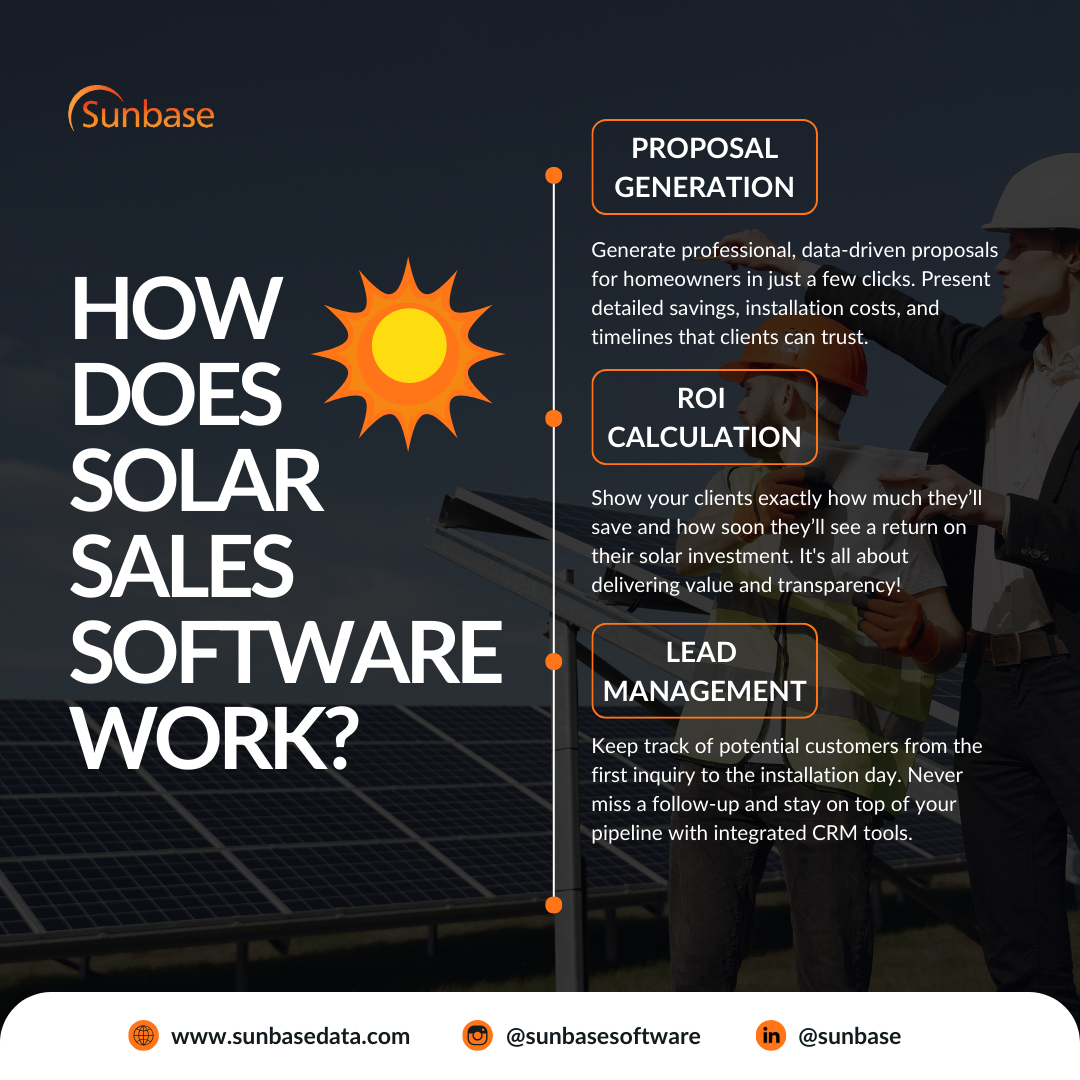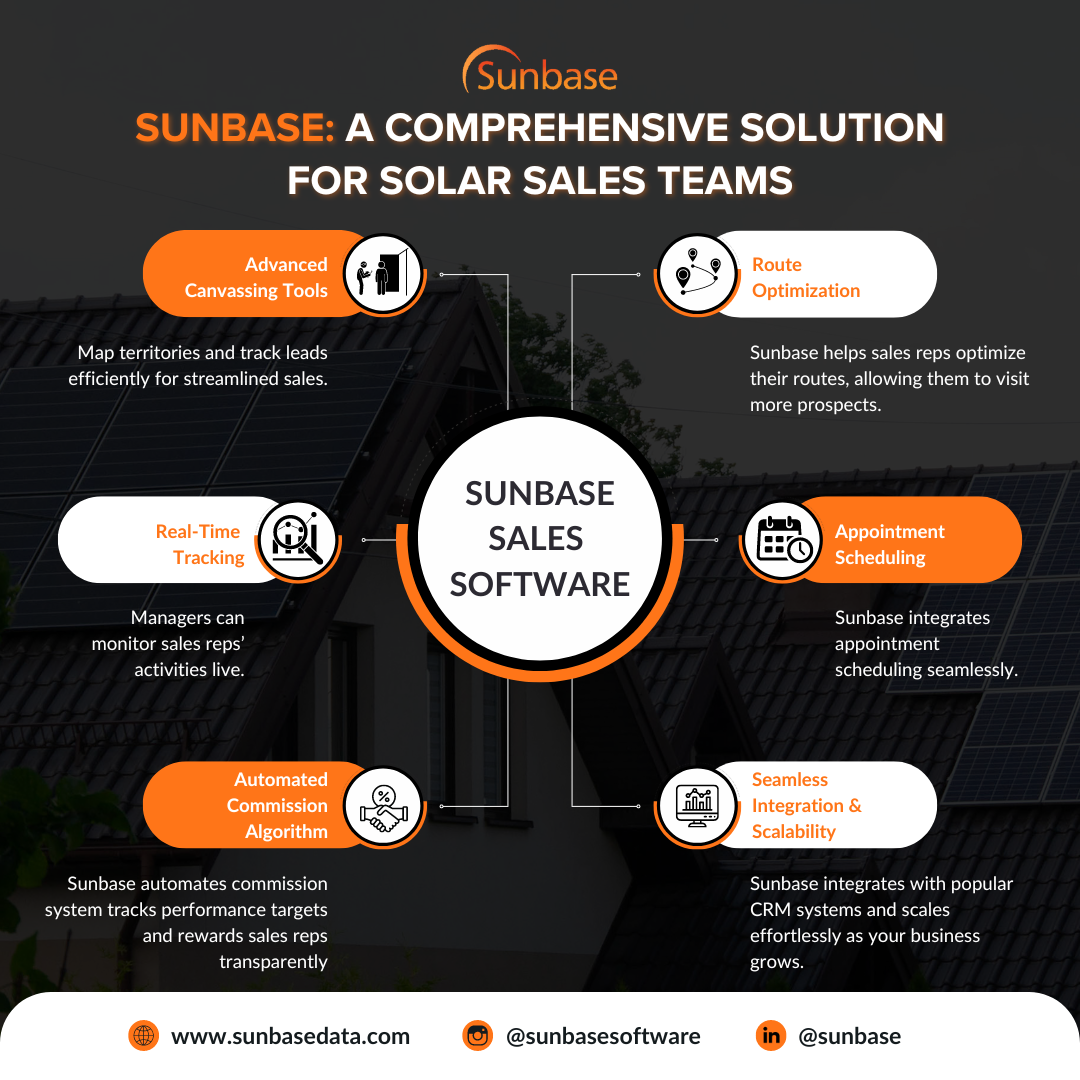December 21, 2022
Solar sales software
"Success is where preparation and opportunity meet." – Bobby Unser
In the fast-growing solar industry, having the right tools can make or break your success. Solar sales software, especially solar proposal software, is a game-changer for installation companies. It streamlines the entire sales process, from creating accurate proposals to managing customer leads.
In this blog, we’ll explore the essential features to look for in solar sales software, helping you choose the right tool to drive your business forward.
How Does Solar Sales Software Work?

Solar sales software is designed to simplify the entire sales process for solar installation companies. Imagine you run a solar company and a homeowner is interested in installing solar panels.
Instead of calculating everything by hand, the software helps you quickly generate a professional proposal with all the important details—like how much energy the homeowner will save, the cost of the installation, and how long it will take to see a return on investment.
Example:
Let’s say a homeowner calls your company.
You enter their home’s details into the software—location, roof size, and energy usage.
The software instantly calculates how many panels they need, how much it will cost, and the savings they can expect.
It also creates a personalized, branded proposal that you can send right away. This speeds up your sales process and makes it easier for the customer to understand the benefits of going solar.
Must Read: The Rise of Mobile Solar CRM: Managing Your Business on the Go
What To Look For In A Solar Sales Software?
Now let's take a brief look at 6 things that you should always look for while choosing Solar Sales Software:
1. Does It Integrate with Solar Design Tools?
When choosing solar sales software, integration with solar design tools is essential for creating accurate and visually appealing solar proposals.
These tools help you design efficient solar systems tailored to each customer's needs, considering factors like roof size, angle, and shading.
By connecting design software with your sales platform, you can seamlessly transfer data, making the entire process faster and more accurate.
For example, once you've designed a solar system, the software can instantly pull the information into a proposal.
This integration not only saves time but also ensures that your solar business provides precise and professional estimates to potential clients. Plus, it reduces the risk of errors, helping you present a polished, data-backed proposal that can quickly move prospects from interest to decision. This level of efficiency is crucial for staying competitive in the solar industry.
2. Is It Accessible for On-the-Go Sales Teams?
For solar sales teams working in the field, mobility is key. Solar sales software should be cloud-based and accessible from any device, allowing team members to pull up solar proposals, update customer information, or track leads no matter where they are.
This flexibility ensures your team can work efficiently from a client’s home, office, or even while traveling.
Mobile access is especially important for solar businesses where sales reps often meet clients on-site. Software that works seamlessly on tablets or smartphones empowers your team to provide real-time information and updates, making the sales process smoother and more engaging for customers.
Choosing software that enables on-the-go access can significantly boost productivity and reduce downtime, ensuring your team never misses an opportunity to close a deal.
3. How Well Does It Manage Leads and Customer Data?
Effective lead and customer data management is crucial for solar installers aiming to grow their business.
Solar sales software should offer built-in CRM (Customer Relationship Management) tools that help track leads, schedule follow-ups, and maintain customer records all in one place.
This centralization makes it easy to stay organized and ensures that no potential customer slips through the cracks.
By keeping track of customer interactions, preferences, and solar project details, the software allows solar businesses to personalize communications and improve client relationships. Having access to this data also helps forecast sales and measure the success of marketing efforts.
Solar software that offers comprehensive lead management can make a big difference in turning prospects into clients, ensuring your business stays competitive and efficient.
4. Does It Provide Real-Time Analytics and Reporting?
Real-time analytics and reporting are essential features of solar sales software, enabling solar businesses to make informed decisions quickly.
With instant access to data, solar installers can track the performance of their sales teams, monitor lead conversion rates, and identify trends in customer behavior. This helps in fine-tuning strategies and improving overall efficiency.
For example, if you notice certain solar projects closing faster than others, real-time reports can help pinpoint what’s working and what needs adjustment. Access to detailed analytics also allows you to forecast sales, adjust pricing, and even streamline the solar proposal process.
Having the ability to generate on-demand reports keeps your solar business agile and responsive, ultimately leading to better decision-making and increased profitability.
5. Is the Software User-Friendly?
Your team, from sales reps to solar installers, should be able to navigate the software with ease, without needing extensive training.
The software should feature a simple, intuitive layout, making tasks like creating solar proposals, managing customer data, and generating reports hassle-free.
Complex software can slow down productivity and lead to frustration. Look for a platform that streamlines the solar sales process, offering clear menus, drag-and-drop options, and automation features that simplify workflows.
The easier the software is to use, the faster your team can adopt it and maximize its benefits. User-friendly solar software ensures smooth day-to-day operations, saving time and allowing your team to focus on closing more deals efficiently.
6. Can the Software Scale with Your Business?
As your solar business grows, your sales software needs to grow with it. When evaluating solar sales software, consider its scalability. A scalable solution can adapt to increased sales volume, new team members, and expanded service offerings without losing performance or requiring a complete overhaul.
Look for software that offers flexible pricing plans and customizable features. This ensures that as your business evolves—whether you’re handling more solar projects or entering new markets—the software can accommodate those changes without major disruptions.
Additionally, it should support added functionalities like advanced analytics, integrations with other tools, and enhanced customer management features as your needs grow. Investing in scalable solar software today will set your business up for future success, allowing you to focus on expansion and innovation while maintaining efficient operations.
You may also like: Empowering Project Managers with Solar Design Software: Boosting Efficiency and Accuracy
Sunbase: A Comprehensive Solution for Solar Sales Teams

Sunbase Sales Software empowers solar installation companies with efficient tools for managing proposals, leads, and customer relationships, driving sales growth and enhancing operational efficiency:
- Advanced Canvassing Tools: Sunbase provides robust canvassing tools that allow users to map out territories effectively, ensuring that sales reps cover specific areas efficiently. This feature also enables tracking of interactions and lead management, streamlining the sales process.
- Route Optimization: The software employs intelligent route planning to help sales reps maximize their time and efficiency during canvassing. By optimizing routes, reps can visit more prospects in less time, leading to higher conversion rates.
- Real-Time Tracking: With real-time tracking capabilities, managers can monitor the locations and activities of sales representatives live. This feature enhances accountability and allows for better resource allocation during sales campaigns.
- Appointment Scheduling: Sunbase includes integrated scheduling tools that simplify the process of setting up follow-up appointments with prospects. This ensures that no lead is neglected and helps maintain consistent communication with potential customers.
- Commission Algorithm: The software features an automated commission algorithm that helps set and track performance targets for sales reps. This ensures transparency and motivates team members by clearly defining their earning potential based on performance.
- Scalability: Sunbase Sales Software is designed to grow with your business, making it adaptable for companies of all sizes. Whether you’re a small startup or a large enterprise, the software can be customized to meet your evolving needs.
- Integration Capabilities: Sunbase seamlessly integrates with popular CRM systems, allowing for a smooth flow of data between platforms. This connectivity enhances efficiency and ensures that all customer information is up-to-date and accessible in one place.
Sunbase empowers solar sales teams to work smarter, not harder. Combining cutting-edge technology with user-friendly interfaces, enables sales reps to focus on what matters most – closing deals and growing your solar business.
Conclusion
In conclusion, choosing the right solar sales software is crucial for the success of your solar business.
By prioritizing features like integration with design tools, mobile accessibility, lead management, real-time analytics, user-friendliness, and scalability, you can streamline operations and enhance productivity.
Investing in the right software will empower your team to close more deals and drive growth in the solar industry.
Contact Us
Ready to elevate your solar business with Sunbase Sales Software? Our team is here to help you find the perfect solution tailored to your needs. Whether you have questions, need a demo, or want to learn more about our features, don’t hesitate to reach out.
Contact us today and let’s take the next step towards boosting your sales efficiency!
FAQs
Q1. What features should I prioritize in solar sales software?
Ans-
When selecting solar sales software, prioritize features like integration with solar design tools, mobile accessibility for on-the-go teams, robust lead management capabilities, real-time analytics and reporting, user-friendly interfaces, and scalability to accommodate future growth.
Q2. How can solar sales software improve my sales process?
Ans-
Solar sales software streamlines the sales process by automating proposal generation, managing customer data efficiently, and providing real-time insights. This helps solar installers save time, reduce errors, and enhance customer interactions, ultimately leading to higher conversion rates.
Q3. Is cloud-based software better for solar businesses?
Ans-
Yes, cloud-based software offers greater flexibility and accessibility for solar businesses. It allows team members to access information and work from any location, making it ideal for field sales teams. Additionally, cloud solutions often provide automatic updates and easy scalability as your business grows.
I agree to receive marketing messaging from Sunbase at the phone number provided above. I understand data rates will apply, and can reply STOP to OPT OUT.







